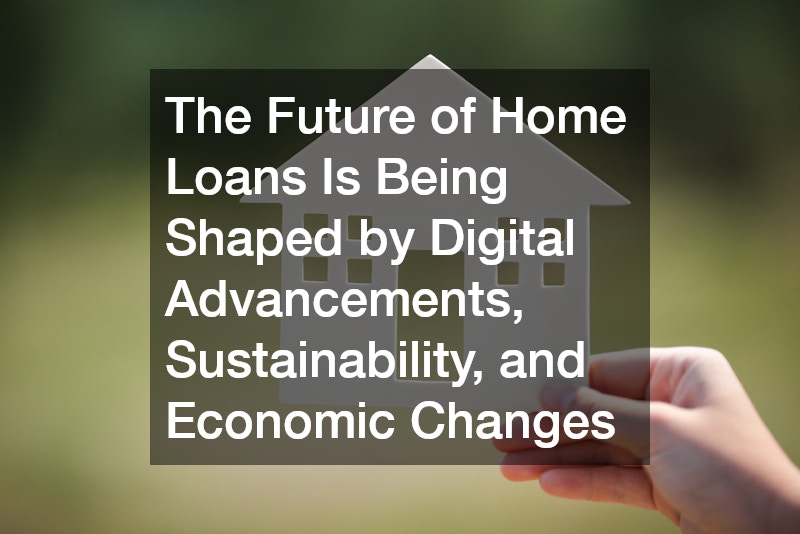The Future of Home Loans: Trends to Watch
The landscape of home loans is evolving rapidly, shaped by technology, economic shifts, and changing consumer preferences. As we look ahead, understanding the trends in this sector is crucial for homeowners, lenders, and investors alike. The future of home loans promises more innovation, greater accessibility, and smarter solutions that cater to the needs of a diverse range of borrowers.
1. Digital Transformation in Home Loan Processes
The digitization of the mortgage industry is one of the most significant trends reshaping home loans. Traditional paper-heavy processes are being replaced with streamlined, online platforms that improve efficiency and reduce approval times. From applying for a loan to signing documents electronically, borrowers now experience a more convenient and faster process.
Artificial intelligence (AI) and machine learning are playing pivotal roles in this transformation. Lenders are using AI-driven algorithms to analyze creditworthiness, assess risks, and provide personalized loan options. For example, automated underwriting systems reduce the time it takes to approve a loan by analyzing vast amounts of data in minutes. These innovations are not only saving time but also minimizing errors, making home loans more accessible to a broader audience.
2. Rise of Fintech and Alternative Lending
Fintech companies are disrupting the traditional mortgage market by offering innovative lending solutions. These companies provide more flexible and transparent options for borrowers who may not qualify for loans through conventional banks. With fewer bureaucratic hurdles, fintech lenders appeal to millennials and first-time homebuyers seeking quicker approvals and lower fees.
Additionally, alternative lending models, such as peer-to-peer lending and crowdfunding, are gaining traction. These platforms connect borrowers directly with investors, bypassing traditional financial intermediaries. As fintech continues to expand, the future of home loans will likely include a greater variety of loan products tailored to niche markets.
3. Focus on Sustainability and Green Financing
Environmental awareness is influencing the mortgage industry, with lenders increasingly offering green home loans. These loans incentivize homeowners to invest in energy-efficient properties or make eco-friendly upgrades, such as installing solar panels or energy-saving appliances. Borrowers may benefit from lower interest rates or special terms that support sustainability.
As governments and financial institutions prioritize climate goals, green financing is expected to grow significantly. Homebuyers looking to reduce their carbon footprint and save on energy costs will likely turn to these environmentally conscious loan options.
4. Adoption of Blockchain Technology
Blockchain technology is poised to revolutionize the home loan process by enhancing transparency, security, and efficiency. Through blockchain, mortgage transactions can be securely recorded on a decentralized ledger, reducing the risk of fraud and errors. This technology also simplifies the verification process, making it easier for lenders to validate documents such as titles, appraisals, and financial records.
In the future, blockchain could enable smart contracts that automatically execute loan agreements once specific conditions are met. This innovation has the potential to eliminate intermediaries, reduce costs, and speed up the entire lending process.
5. Personalized Loan Products
The demand for customized home loans is growing as borrowers seek options that align with their unique financial situations. Lenders are responding by offering more flexible loan structures, such as adjustable-rate mortgages (ARMs), interest-only loans, and hybrid products.
Advancements in data analytics allow lenders to assess borrowers’ financial behaviors and preferences to create personalized solutions. For example, a lender might design a loan product that accommodates irregular income streams, such as those of gig workers or freelancers. This level of personalization ensures that home loans remain relevant and accessible to a wider range of individuals.
6. Impact of Artificial Intelligence on Risk Assessment
Artificial intelligence is transforming risk assessment in the mortgage industry. By leveraging big data, AI can evaluate a borrower’s credit history, income, and spending habits with greater accuracy than traditional methods. This enables lenders to make more informed decisions and offer loans to individuals who may have been overlooked in the past.
For instance, AI-powered tools can identify patterns that indicate a borrower’s ability to repay a loan, even if their credit score is lower. This trend is particularly beneficial for underserved populations, providing opportunities for homeownership to a broader segment of society.
The future of home loans is being shaped by digital advancements, sustainability, and economic changes. From AI-driven risk assessments to blockchain-enhanced processes, these trends promise to make the mortgage industry more efficient, transparent, and inclusive. As fintech companies and traditional lenders continue to innovate, borrowers can look forward to smarter, more personalized home loan solutions. Whether you are a first-time buyer or a seasoned investor, staying informed about these trends will help you navigate the evolving landscape of home loans with confidence.
.

